Inside: Creating positive sibling relationships between your kids is vital to the overall health of your family. It’s not always easy, but there are 17 ways to prevent sibling rivalry and jealousy by focusing on making your kids’ relationships with one another stronger.
Mom, she told me I was a bad dancer.
No, I didn’t. I said I was a better dancer.
But you’re not. I’m the best dancer ever.
No, you’re not. Mom, she just said I was a bad dancer.
Mom, who is the best dancer? Which one of us does it better?
You have to pick. Who is the best at dancing?
Ugh. Are you kidding me?
As a mom, these exchanges between my kids drive me bat sh*t crazy.
Because I want my kids to do more than live together.
I want them to enjoy each other’s company.
I want them to want to be together.
And I want to hear shrieks of giggles rather than shrieks of bickering, arguing, and teasing.
So we spend a lot of time and energy in our family to prevent sibling rivalry by creating positive sibling relationships.
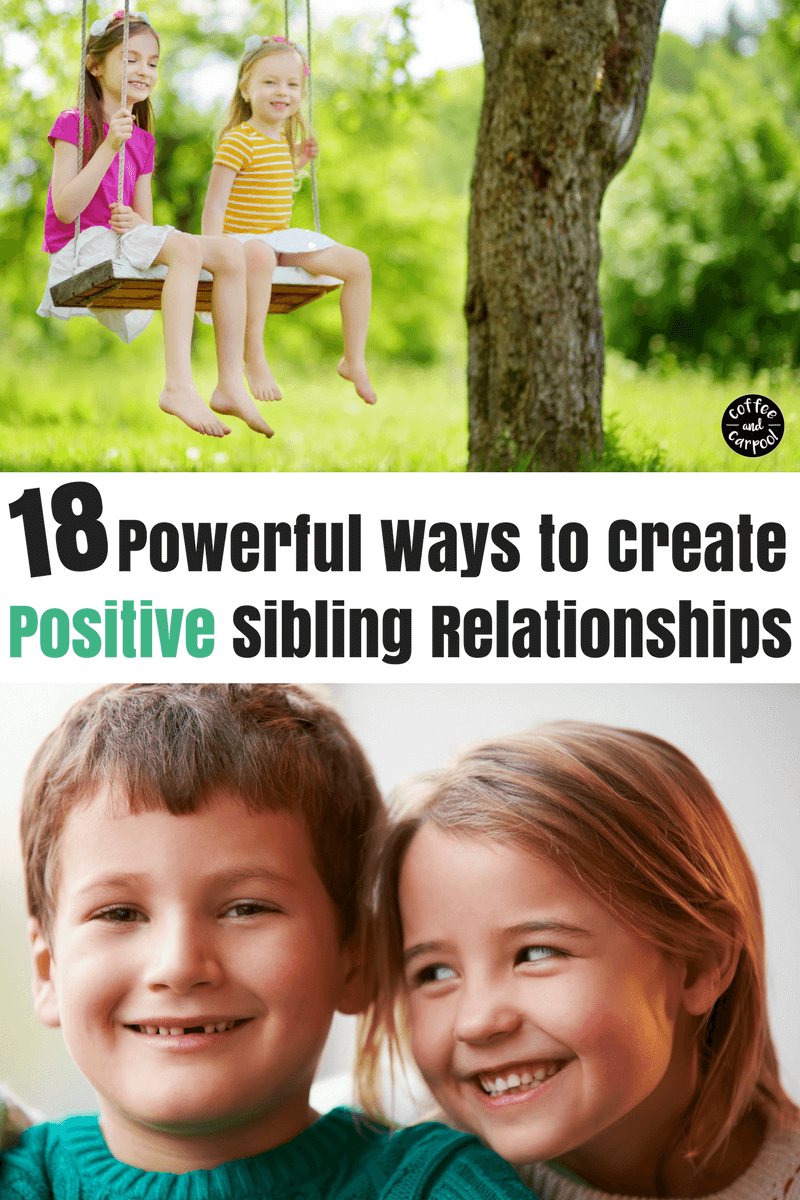
Why are Positive Sibling Relationships Vital?
I want our home to be a safe haven for my kids. The world can be crazy, and unkind, and harsh. But when they come home, they’re safe. They can let their hair down and their guard down and be themselves.
I want our home to be a place to feel and know love and support.
And it can’t just come from us, their parents. The love and support and kindness has to also come from their siblings.
But that needs to be intentionally taught and then expected. Kids won’t treat their siblings well all the time.
So we work on it. All the time.
Because positive sibling relationships are vital to their overall well-being.
Siblings help you:
- practice being a leader and a follower,
- learn to take turns and share,
- learn how to apologize and how to avoid hurting people’s feelings,
- deal with criticism when they call you out when you mess up
Siblings know your strengths and your weaknesses and they will either exploit them or help you be a better person.
So a positive sibling relationship is vital to the calmness and peacefulness of our home.
If my kids are bickering or being nasty to one another, I get riled up quickly because it’s one of my angry mom triggers.
So we work hard to encourage positive sibling relationships between all three of our kids.
How to Prevent Sibling Rivalry:
1. Start before the siblings are even born:
How you talk about your baby before and right after their birth will lay the groundwork for how their siblings feel about them and interact with them.
There are several ways you can ensure it’s a positive relationship from the beginning, like introducing books that showcase positive sibling relationships.
Here are a few of our family’s favorites:
2. Don’t require your kids to share:
Sharing is way too grown up of a concept for young kids to grasp. They will learn how to share with modeling and positive reinforcement over time.
Instead of sharing, we teach our kids to take turns, and it works like magic.
They know how to ask for a turn politely and how to take turns with things they really want like holding the buzzer at restaurants, choosing the next song Alexa plays, and who gets to use the blue crayon.
And my kids are not required to share or turn take with things that are extra special to them. They can put those “specials” away somewhere safe to feel ownership over things that are extra important to them.
And this one shift has eliminated 50% of the sibling squabbles in our home.
3. Have multiples of favorite toys:
Since our kids are close in age, they often want to play with the same toys at the same time.
One simple fix is to have multiples of their absolute favorite toys. We have multiple puzzles, buckets of chalk and crayons and markers with duplicate colors, and three soccer balls.
They won’t have to turn take as often when there’s two or three of the coveted item.
4. Be mindful of how you speak about and to your kids in front of their siblings:
The book Siblings Without Rivalry guided how my husband and I speak about our kids and to our kids in front of each other to avoid jealousy and rivalry.
I seriously cannot say enough incredible things about how this book opened my eyes to the damage even a small phrase said in passing can do to cause jealousy and a rift between siblings.
If you have more than one child, Siblings Without Rivalry is a must-read parenting book.
5. Avoid labels and save the praise for private:
When we talk to our kids and tell them things like “You’re so athletic,” our other kids hear, “She’s athletic so I must not be.”
If I tell my son he’s incredibly artistic, my daughters hear, “He’s artistic so I’m not artistic.”
Obviously, that’s not what we’re saying at all, but that’s what they hear.
And the damage is done.
So we praise them and tell them why we’re proud of them out of earshot of our other kids.
Because kids can’t understand that just because I’m telling their sibling their drawing is amazing, doesn’t also mean I think their drawing is amazing too.
So we take a moment and pull each of them aside to tell them their drawings are so detailed and we love the colors they chose, and their soccer game is on point and we love their hustle, and the new story they’re writing is so creative and we can’t wait to read more.
6. Give your kids a spot to be alone:
Most kids need a room, a spot, or a safe space to call their own.
This is especially true if you are raising an introvert or a kid who needs downtime to recharge, but even my little extrovert requires a space that is hers and hers alone to retreat to when she’s tired of being with her siblings.
When we had a big house, all of my kids had their own room, so it was easy to find alone time.
Now that we’re back in our smaller home and my kids share a room, we’ve had to get creative.
We’ve made a reading and drawing nook in a closet, hung up curtains around a bunk bed to offer up “privacy,” and have created a hiding spot under some tall bushes for my son.
It’s their spot to go to when they’re not wanting to spend time with their siblings.
And it recharges them so they’re ready to interact and play together later.
Plus it gives them a sense of ownership in our home that solidifies their feelings of belonging here.
7. Expect kindness:
Being kind is one of our only two family rules. And with good reason.

It eliminates name calling, whispered secrets behind someone’s back, tricking siblings, interrupting each other, ignoring each other on purpose, and teasing.
All things that lead to feelings of being left out, ostracized, or put down, which feels hurtful.
Kids who have hurt feelings act out with meanness as retaliation.
8. Eliminate superlative language:
Another way to avoid hurt feelings is to avoid “best,” “better,” “worst,” and words that end in -er or -est because it avoids a comparison game and a need to one-up each other.
I’m the fastest. I’m the best dancer. I’m the prettiest. I’m smarter.
Kids can be fast without being the fastest.
They can be a good dancer without needing to proclaim themselves to be the best.
They can be smart without being smarter than someone next to them.
9. Decide on and then prohibit “outlawed” words:
Every family has a different threshold of words or phrases they will or will not allow in their house.
And while I know I need to pick my battles as a parent, this is one battle I choose to pick.
Because how we talk to each other and about each other has a deep impact on the overall health of our family.
To cultivate a family who is kind to one another, we have eliminated several phrases which include: shut up, stupid, loser, jerk, sucks, dumb, hate, crap, duh, and I don’t care.
10. Create a strong family identity:
We focus on creating a strong family identity for several reasons. But a major benefit is when our kids are more connected to each other and to us, it prevents sibling rivalry and jealousy.
When our kids know they’re a valued member of our family, they want to be here.
They want to have dance parties in the kitchen and go on our family dates and head to the beach whenever we can. And our kids have fun when they are together.
Which is an improvement over put-downs, angry words, and slammed doors.

11. Connect with each child individually:
Kids who feel secure in their relationships with their parents won’t feel the need to compete with their siblings to get their parents’ attention and affection.
To really connect with each of our kids, we often go on dates with each of them.
They feel valued and important and have no need to compete with each other when we get back home.
12. Have family meetings and let the kids make decisions:
Not all decisions are up for a discussion. But when my husband and I can, we let our kids decide.
Especially when the decision directly affects them or they will perceive our decision on their behalf as being “unfair.”
My three kids worked out who would have the first, second, and third sleepover at their grandparents’ house without bickering or complaining and I got to avoid being the bad guy to the two kids who had to wait their turn.
13. Let them work out their squabbles if they’re doing it with kindness:
All siblings are going to bicker and have squabbles. It’s okay if they get mad and frustrated or annoyed with each other.
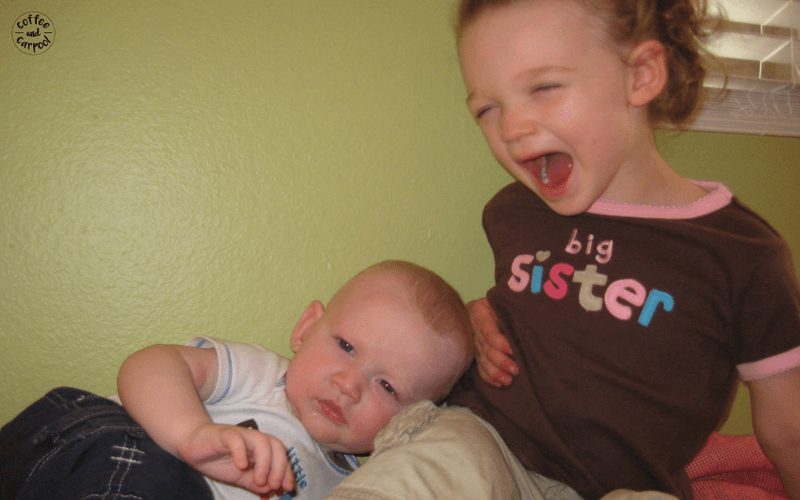
But voicing their frustrations and then figuring out how to work it out is part of growing up and learning how to interact, live, and work with other people.
I give them time to share their feelings, but I step in when their anger and frustration morphs into mean and unkind words or dangerous actions.
14. Ensure they listen to each other:
In an effort to make living in a small house together easier, my kids have to listen to each other’s requests.
Please stop singing.
Please turn down your music.
Please get off my bed.
When kids feel listened to and therefore respected, they’re not going to feel like they need to raise their voice or get mad to get heard.
This especially applies to honoring “stop” and “no” requests. If they’re roughhousing, playing, or tickling each other, “stop” means “stop.” And “no more” means “no more.”
15. Assign seats in the car:
This may sound silly, but assigned seats in the car avoids one more thing to squabble or fight over.
Everyone knows where they’re sitting so there’s no rush to fight over the “best” seat.
I knew one family who used the even and odd days on the calendar to determine who sat where in the car.
16. Find something they all love and enjoy together:
Spending time together doing something they all love is a simple way to foster more fun memories together that can carry them over when they’re annoyed with each other.
As a family, we created a bucket list of things we want to do together.
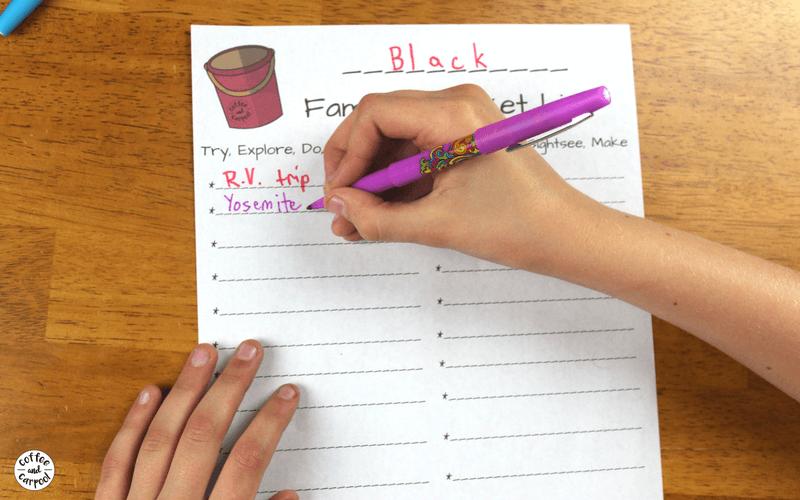
We also have family favorite TV shows, movies, board games and books that everyone loves to enjoy together.
17. Help them deal with perceived unfairness:
A lot of sibling issues come from resentment towards a sibling when something feels “unfair.”
My eldest does more chores than her younger sister and therefore thinks this is unfair. I have to remind her that when she was 6 she did one chore, just like her sister does now.
My youngest has to turn out her lights sooner than her older siblings which she feels is “unfair.” I have to remind her often when they were her age, they had to turn off their lights earlier, and when she’s older she can read longer.
It’s not going to be even or equal all the time, but that doesn’t make it unfair.
18. Answer them when they ask if you have a favorite child with a ‘yes’:
I tell each of my kids they’re my favorite, but I do it when it’s just the two of us:
- You are my favorite son (I only have one),
- You are my favorite 10-year old,
- You are my favorite Kindergartner, and
- You are my favorite Addison.
And we read the book, You are All My Favorites.
Because they are.
They’re especially my favorites when they’re kind and giggling together and being sweet with one another.
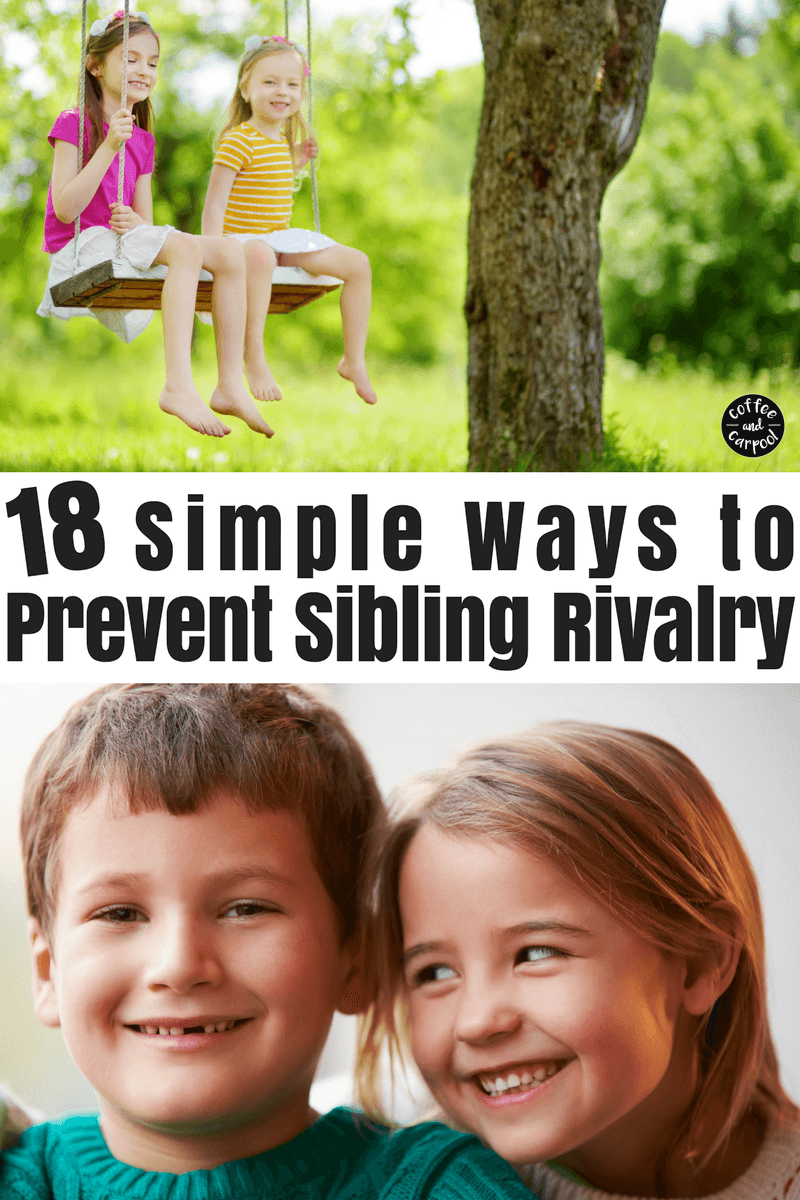
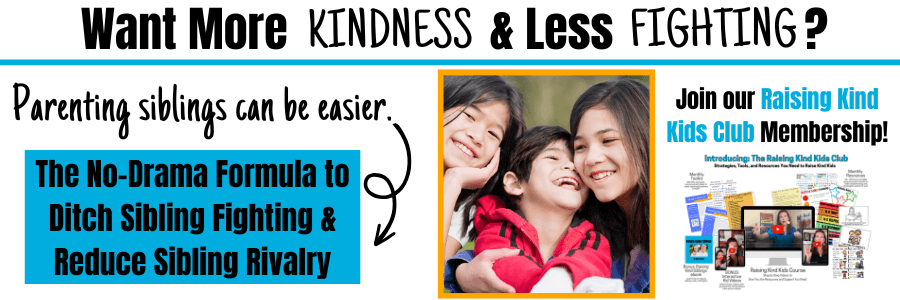



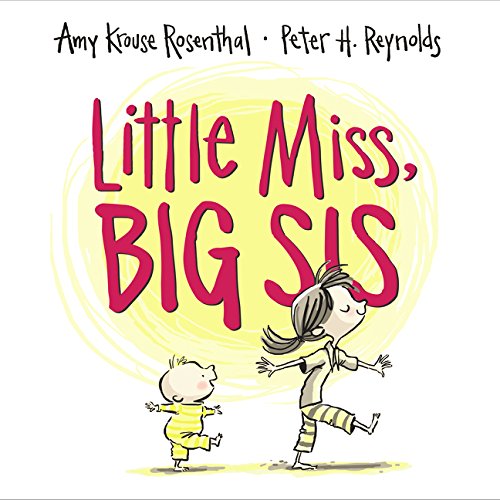

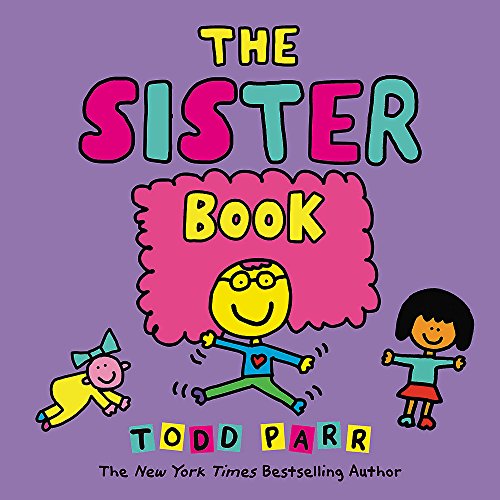
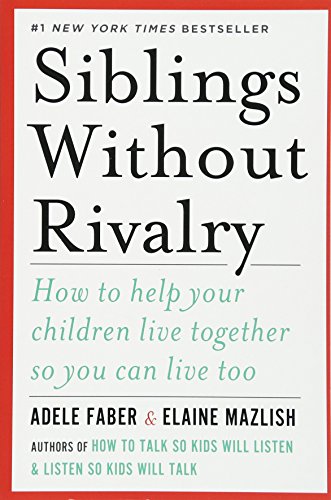

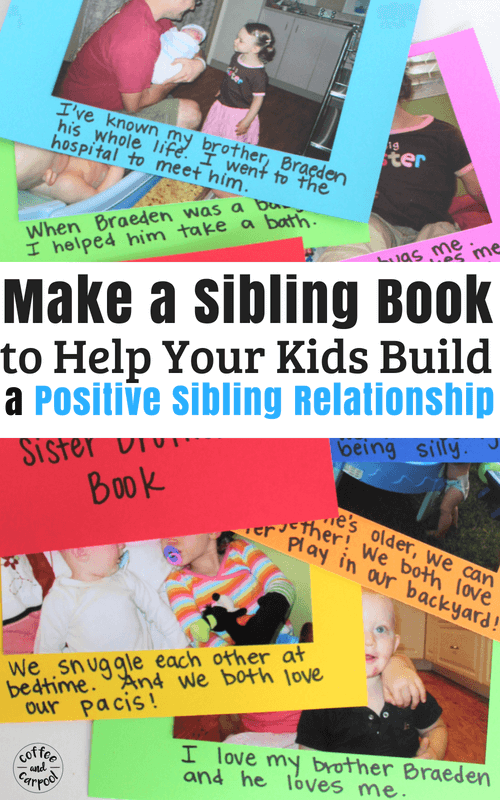
Leave a Reply